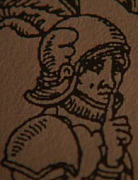|
Does anyone know if this painting is at all accurate to what the surrender ceremony actually looked like? Some professor wrote this on their web page: quote:Painting above: September 9, 1945, in Nanjing (Nanking), China, General Yasuji Okamura, Commander-in-Chief of the Japanese Expeditionary Forces in China, submitted surrender document to General Ho Ying-ch'in, Commander-in-Chief of the Republic of China Army. World War II officially ended with the victory of United Kingdom, United States, China, and Soviet Union – the four allies or the Four Powers. [Note the flags of the Four Powers on the central background] There's a reddit post claiming this was painted by a man named Chen Jian for the 50th anniversary of the surrender, so it seems unlikely, but maybe he worked off a reference photograph?
|
|
|
|

|
| # ? Jun 3, 2024 16:57 |
|
VostokProgram posted:Does anyone know if this painting is at all accurate to what the surrender ceremony actually looked like? It's fairly stylized to make for a more pleasant and symbolic layout in the painting, but the broad strokes are fine. Here's a photo of the ceremony: 
|
|
|
|
How does the Commuists and Nationalist forces in china start dealing with each other after Japans surrender? Do they immediately knives out on each other full stop? I know there was fighting during ww2 between them but Im under the impression it was relatively low level stuff while they had the japanese to worry about.
|
|
|
|
Defenestrategy posted:How does the Commuists and Nationalist forces in china start dealing with each other after Japans surrender? Do they immediately knives out on each other full stop? I know there was fighting during ww2 between them but Im under the impression it was relatively low level stuff while they had the japanese to worry about. There was a nominal peace for several months where they were jockeying for position; with the US attempting to mediate between the two sides; but neither had any good faith intention to form a lasting government with the other and things turned to blows after a certain point.
|
|
|
|
Defenestrategy posted:How does the Commuists and Nationalist forces in china start dealing with each other after Japans surrender? Do they immediately knives out on each other full stop? I know there was fighting during ww2 between them but Im under the impression it was relatively low level stuff while they had the japanese to worry about. They were knives out before the Japanese surrendered. Constant bickering and non-cooperation between the nationalist and communists severely hampered the Chinese ability to fight their invaders, and get support from the other Allied powers. The fact that Joe Stilwell, the american liason, was a stupid racist rear end in a top hat didn't help his chances of getting them to work together.
|
|
|
|
MRC48B posted:The fact that Joe Stilwell, the american liason, was a stupid racist rear end in a top hat didn't help his chances of getting them to work together. World War 2 in Real Time on YT did a great job of making Stilwell look like a complete tool. They did this by quoting at length from his writings.
|
|
|
|
MRC48B posted:They were knives out before the Japanese surrendered. Constant bickering and non-cooperation between the nationalist and communists severely hampered the Chinese ability to fight their invaders, and get support from the other Allied powers. It got bad enough early on that Chiang's own generals coup'd him and forced him at gun point to agree to a unified front too.
|
|
|
|
Defenestrategy posted:How does the Commuists and Nationalist forces in china start dealing with each other after Japans surrender? Do they immediately knives out on each other full stop? I know there was fighting during ww2 between them but Im under the impression it was relatively low level stuff while they had the japanese to worry about. The CCP and Nationalists were fighting each other before, during, and after the Japanese invasion. The war between them is generally considered to have kicked off in 1927.
|
|
|
|
They should have given him an infantry division in Italy or Africa, not a top level liaison job. He was one of those "no bullshit" guys like Patton who should have been kept as far away from the political war as possible. EDIT: And not be allowed to talk to the press under any circumstances.
|
|
|
|
From what little I have read/heard about it, Chiang Kai-shek was the exact wrong person to wind up in charge of the Nationalist movement, and wound up that way by basically being the last warlord standing after the 20s.
|
|
|
|
Ainsley McTree posted:Has this ever been used as a purposeful strategy? Ie, successfully convince the enemy that being a prisoner of your army is preferable to being a soldier in their own (and, hopefully, follow through on that promise)? Or do wars tend to be more cutthroat than that, generally This question is two months old and has probably been answered several times by now, but I just had to add that Orwell writes a bit about how this worked in the Spanish Civil War - at least in the trenches-almost-out-of-range-of-each-other part of the Zaragossa front he himself was involved in. Since neither side could realistically attack the other, the war on that front was mostly fought by taking pot shots by day and by shouting enticements to desert over to your side by night. He says that at first he and the other international volonteers felt a bit irked by this, they had all signed up to go and heroically fight fascism on the frontlines of a war, but here they're only fighting cold and boredom, and the only "fascists" they see up close are scrawny teenage draftees that could be lured over to your side with the promise of a hot meal. To Orwell and the other foreigners, it felt as if the Spaniards "didn't qute take their own war seriously". But after a while they came to realize that the constant trickle of night time desertions from the fascist side was undeniably more effective than the pot shots he and the others took - especially as it not only drew away men from the enemy, these men also came with intel about the other side and could sometimes even be turned into fighters for your side if they were willing.
|
|
|
|
FishFood posted:From what little I have read/heard about it, Chiang Kai-shek was the exact wrong person to wind up in charge of the Nationalist movement, and wound up that way by basically being the last warlord standing after the 20s. Chiang('s wife) was very good at PR in America, which was far and away his most useful trait as a general and politician
|
|
|
|
Jack B Nimble posted:Sam Sheridan wrote a book, A Fighter's Mind that collected a series of interviews asking top fighters and athletes about their philosophy or view on what makes a great fighter, combined with essays of his own reactions and thoughts, and at one point he made the argument that a lot of the Zen Buddhism talking points you see in Orientalist interpretations of martial arts, and also the translation of the Five Rings, start to sound very similar to modern sports psychology when you strip away the orientalist prose. Seconding a recommendation for this book. I read it at the tail end of my own, middling, fight career and it captures so many ideas and concepts I'd had floating about in my brain without realizing. Anyone with any interest in sports psychology, definite read.
|
|
|
|
Defenestrategy posted:THAT SAID, the way the us military trains hand to hand combat for the vast majority of its soldiers, is not really worth anything and is only really there to maybe give a soldier a teeny tiny fraction of a hope that they might get lucky and defend themselves when they are entirely out of weapons, because to be competent at hand to hand fighting, let alone good takes constant practice that generally soldiers have better poo poo to be doing than practicing for hand to hand combat that could theoretically take place in the worst case scenario. This is entirely true, but the same can be said of any enemy. It's like the old joke about the two guys trying to outrun the tiger; you don't have to be faster than the tiger, just faster than the other guy. There's no way a military can really train their soldiers to better at hand-to-hand fighting than some MMA champion, but "guy with a little training" might do better than "guy with zero training" in the exceptionally rare instance when it comes down to it. And, more importantly, it's a way to do exercise and make your soldiers feel tough.
|
|
|
|
Defenestrategy posted:How does the Commuists and Nationalist forces in china start dealing with each other after Japans surrender? Do they immediately knives out on each other full stop? I know there was fighting during ww2 between them but Im under the impression it was relatively low level stuff while they had the japanese to worry about. The US actually sent George Marshall to try to mediate a peace agreement between the Communists and Nationalists and came away from the experience with a sense that Chiang didn't understand he needed a peace and he couldn't convince Zhou Enlai to take the process seriously. Part of the reason the Germans were telling Chiang to pick about 40-50 good divisions and train them up is because they wanted him to jettison the rest of the army as it was costing an enormous amount of money and manpower with little military value. They were not incorrect, and maintaining a force the size he did over 20+ years was debilitating to the national economy. He really needed a chance to demobilize and get things in order, but there was always another war around the corner. This is part of the reason the war went so badly so quickly- as soon as the Communists got momentum, unpaid troops were very willing to flip and create a snowball effect as they gained momentum. When the war ended, the US had to delay the repatriation of Japanese garrison troops to keep the coastal cities available for Chiang to take, as the communists were much closer and more capable there, and later on USMC troops were provided, because Chiang's troops were so slow to recoccupy their own territory. To make large scale maneuvers they relied on airlifting troops en masse and in 1945 the US was doing everything they can to airlift Chiang's troops to the coast.
|
|
|
|
The MACP, or Army's version of MMA, seems to do the trick decently. After a one week course, you had people go for various chokes and being able to escape various holds. Also since you get punched in the face in it in the last day during the thing where you just have to defend yourself at all costs against multiple attackers, it seemed to instill a bit of resiliency in many people who were terrified of the punches. No one's gonna win an MMA title, but I did genuinely feel like basically everyone was a bit better at fighting when it was all done for.
|
|
|
|
As an 11B we were always taught that the purpose of our hand-to-hand combat training (which was mostly BJJ with a dash of bayonet/knife training) was so that we could hold the enemy down until backup arrived with a real weapon to finish them off or capture them. I only ever met 1 person who actually needed to use this training and that was exactly what happened to him.
|
|
|
|
Current status on the primer I'll give the kids at work: 1. Many people are inspired to do martial arts by an "impression" about the philosophy of martial arts they absorb through media or culture. For example, both me and the other club employee got into kung fu because we really liked hong kong movies. Examples of the "philosophy" we acquired could be Lees cup of water speech or the story of Wong Fei-Hung. This is a good place to note that it was common for people to develop their own schools of martial arts before sportification and streamlining of specific arts became common. 2. However, martial arts are mostly systems of combat and sometimes, systems of personal development. They only have the type of 'philosopy' possessed by whoever learns it. Be critical of anyone who says that their martial art training will fix your life. If you're into martial arts as a lifestyle, consider getting more into the meditation systems we taught you and train and play hard. Getting to know your body and using is also a kind of philosophy, and one that helps keep you healthy. 3. Even though I said you get an impression and should be critical, martial arts are cool and good and if you do actually train kung fu, karate or jiu-jitsu with a person who's learned it in the country of origin, it will be interesting as heck and can be the start of a lifelong interest in asian, south american etc. culture and we encourage you to open your mind like that. It's just going to be a very rough introduction over breakfast, so I think that's what I'll be able to include. Feedback is still welcome if you have it. Tias fucked around with this message at 07:56 on Jan 16, 2024 |
|
|
|
Also, raid redemption is a kickass movie. But seriously that looks good to me i think you hit all the points nicely
|
|
|
|
It’s a very Me kind of point*, so up to you if it’s the right thing to bring up, but “kung fu” doesn’t mean “kung fu” in Chinese** : 功夫 gong fu doesn’t translate literally well (it’s “cultivate” and then a very complex half of a word), but it actually means something like “personal mastery” : it’s any skill or trade someone has spent a major chunk of their life perfecting. Ranging from professional skills to hobbies, calligraphy or music or cooking or poetry or whatever. Martial arts is totally in that bag, but it’s not the whole bag. The most neutral word for martial art is 拳法 (quan fa ; “q” makes a “ch” sound), literally “fist discipline”. There are a bunch of other words, but they have specific connotations. E.g. 武術 (wushu), literally “war art”***, was a generic term but now means the PRC’s non-combat flippy Chinese opera dance fighting thing that Jet Li does. *Also you might not be having this conversation in English, in which case ¯\_(ツ)_/¯ **it sort of does now, because it’s been loaned back into Chinese from English in an ouroboros of etymology. Love it when that happens. ***Japanese speakers will recognize that as how you write “bujutsu” which is similar ; the rare time when borrowing a writing system a thousand years ago actually helped.
|
|
|
|
I took judo classes to research how to animate judo moves for a game project, got as far as green belt before stress/financial devastation and a lucky job offer in Ottawa with CSEC rescued me from said devastation so I haven't had a chance yet to resume my training since coming back to Montreal. There's also a sort of satisfaction from progression and the confidence being able to consistently and under pressure of sparring matches implement what you've been practicing. I'm increasingly tempted to go back now that I've mostly fixed my finances and have lost enough weight that I'm no longer in my own weight class where I'm throwing all the tiny Bulgarian judoka at the dojo but only like one big guy and one genius tiny kid could throw me back.
|
|
|
|
Tias posted:This is a good place to note that it was common for people to develop their own schools of martial arts before sportification and streamlining of specific arts became common. I have issues with this depending on what you mean. True combat arts have always been "sportified" because at its core, it's really really hard to train if you or your partners are always injured/dead, and sparring is the most important training tool in any art that is seriously about killing or hurting another human being. You can see it even today with firearms stuff with Mout courses, where you're either not shooting at actually people or are using stuff like MILES or paintball/airsoft weapons. I doubt that even in ancient times people in training where using sharp swords vs skin or continuing attacks until their logical conclusion[death/maiming]. From a more modern perspective Judo ended up banning certain maneuvers in competition only after tons of judoka ended up with broken bones by accident. Edit: i just forgot about that really stupid german messer dueling thing practiced in the 20th century where the point was to use sharp swords to give people gnarly face wounds to college buddies, but in my opinion like a lot of things in that era of germany it was stupid and hosed up. Defenestrategy fucked around with this message at 18:40 on Jan 16, 2024 |
|
|
|
Defenestrategy posted:Edit: i just forgot about that really stupid german messer dueling thing practiced in the 20th century where the point was to use sharp swords to give people gnarly face wounds to college buddies, but in my opinion like a lot of things in that era of germany it was stupid and hosed up. Even that was (is) extremely "sportified." They deliberately didn't do any sort of footwork or parries; they just stood there and slashed at each other until they got cut. In combat, yeah, I'd try to parry or block attacks, but in Academic Fencing that's considered cowardly - you don't get a scar if you don't get hit in the face. They also wore eye and neck/chest protection so they didn't die. It's also not a "real combat;" it just goes in a different direction. Here's a pic of the eye protection and neck/chest armor: 
|
|
|
|
Cessna posted:Even that was (is) extremely "sportified." Wait, people still do this?
|
|
|
Defenestrategy posted:Wait, people still do this? Look, real method actors playing Prussian aristocrats/generals/villains have to get their scars somehow.
|
|
|
|
|
Cessna posted:Even that was (is) extremely "sportified." They deliberately didn't do any sort of footwork or parries; they just stood there and slashed at each other until they got cut. In combat, yeah, I'd try to parry or block attacks, but in Academic Fencing that's considered cowardly - you don't get a scar if you don't get hit in the face. There was a better way: 
|
|
|
|
Defenestrategy posted:Wait, people still do this? Yes, German chuds.
|
|
|
|
Defenestrategy posted:I have issues with this depending on what you mean. True combat arts have always been "sportified" because at its core, it's really really hard to train if you or your partners are always injured/dead, and sparring is the most important training tool in any art that is seriously about killing or hurting another human being. You can see it even today with firearms stuff with Mout courses, where you're either not shooting at actually people or are using stuff like MILES or paintball/airsoft weapons. I doubt that even in ancient times people in training where using sharp swords vs skin or continuing attacks until their logical conclusion[death/maiming]. From a more modern perspective Judo ended up banning certain maneuvers in competition only after tons of judoka ended up with broken bones by accident. Yeah, I guess that wasn't what I meant. I should have said "commercialized" or "a mass pastime in the western world", which is what I feel was the point in time (and I could well be wrong, in which case I'll change it) that you got a lot of pretty low-quality schools and a greater focus on profiting off these martial arts newfound popularity and less time on the internal practices of philosophy and meditation, for example. Xiahou Dun posted:It’s a very Me kind of point*, so up to you if it’s the right thing to bring up, but “kung fu” doesn’t mean “kung fu” in Chinese** : It's in Danish, but yeah, never apologize for Xiahou Dun posting, this is great!
|
|
|
Cessna posted:Yes, German chuds.
|
|
|
|
|
What was the end goal of a battleship? Say your mighty battleships sweep the sea of the enemy's battleships; then what? Were they then going to shell coastal cities until the enemy capitulated?
|
|
|
|
Nessus posted:Are these the same people who claim that Karl Doenitz was the last legitimate German leader and as such they do not need to pay this parking ticket? There is some overlap but for the most part they are the same type of people who in the USA would be joining the same fraternity in the same college that their father and grandfather and all they guys on the board of the company that their father is part of joined.
|
|
|
|
Greg12 posted:What was the end goal of a battleship? Sea Control. That is, once you've destroyed the enemy's fleet you can destroy their commercial shipping and blockade their ports, wrecking their economy and trade and maybe even starving them. You can also potentially land troops on an enemy's coast where/when you want to. Edit to add: That's a very tl;dr answer, if you want more depth, look up the writings of Alfred Thayer Mahan. Here is a concise starting point. Cessna fucked around with this message at 19:37 on Jan 16, 2024 |
|
|
|
Greg12 posted:What was the end goal of a battleship? The battleship was just that era's decisive weapon for war at sea, so the end goal of the battleship is the end goal of the navy: sea control. Having sea control means you can conduct global trade, which is vital for prolonged warfare. It enables you to deny that same trade to the enemy. It means you can land on the enemy's coast at will and they can't land on yours. Some combination of those factors can often decide a war, even if playing it out to the endgame requires land warfare.
|
|
|
|
Tias posted:Yeah, I guess that wasn't what I meant. I should have said "commercialized" or "a mass pastime in the western world", which is what I feel was the point in time (and I could well be wrong, in which case I'll change it) that you got a lot of pretty low-quality schools and a greater focus on profiting off these martial arts newfound popularity and less time on the internal practices of philosophy and meditation, for example. Cool, there's some quibbling I could do about even this, but it'd just be old man yelling at clouds kinda thing, but good enough for a presentation to kids about learning the cool and fun arts of man kick punch hug.
|
|
|
|
Greg12 posted:What was the end goal of a battleship? Shelling coastal cities wasn't as important as blockading them and supporting infantry landings. A battleship carries only so much ammunition, and there's limits to how close you can get to the coast due to coastal guns, torpedo boats, mines etc. so unless your enemy is like Zanzibar then it's probably not going to be effective.
|
|
|
|
For the record, while battleships can do shore bombardment, they're hilariously over-gunned for the task. A 12" or 16" shell is just gigantic, and total overkill for any remotely realistic tactical target. Those giant shells take a long time to fire, and of course are also expensive. And to make matters worse, fire control for warships is designed to pick out single targets silhouetted against a horizon, not to range on one lumpy shape amongst a bunch of other lumpy shapes. So accuracy was a problem. In short, while warships have been used for shore bombardment, it's been with middling results, and generally the smaller secondary guns (3-4" shell diameter) are more useful than the big ones. Mind you, being anywhere near a 16" HE shell when it goes off is likely to be an impressive experience. This diagram shows crater sizes for 3", 5", and 6" shells: 
|
|
|
|
My parents bought me Jean Smith's Eisenhower in War and Peace, and the post-Normandy stuff is provoking me a little. Smith seems to have a lot of admiration for Montgomery and seems to think Ike would have done better to defer to him on strategy. My bias coming into this is that Montgomery was a pompous rear end who was much better at set-piece battle than mobile warfare, though he was probably the best of the senior Allied leaders at using his cult of personality to inspire his troops. His most famous victory, second El Alamein, was partially his creation, but also drew on a lot of the Auk's work, and on the huge advantage in material he was able to accrue because the Allies got control of the Med. Am I being too hard on him?
|
|
|
|
there's more to it than warren zevon and daffy duck let on, then edit: that was needlessly stupid Warren Zevon: Veracruz bombardment Daffy Duck quoted Dewey and said, "You may fire when ready, Gridley." Greg12 fucked around with this message at 19:58 on Jan 16, 2024 |
|
|
|
What types of battleship main gun shells did they use in WW2? I know there was that IJN
|
|
|
|

|
| # ? Jun 3, 2024 16:57 |
|
Zorak of Michigan posted:My parents bought me Jean Smith's Eisenhower in War and Peace, and the post-Normandy stuff is provoking me a little. Smith seems to have a lot of admiration for Montgomery and seems to think Ike would have done better to defer to him on strategy. My bias coming into this is that Montgomery was a pompous rear end who was much better at set-piece battle than mobile warfare, though he was probably the best of the senior Allied leaders at using his cult of personality to inspire his troops. His most famous victory, second El Alamein, was partially his creation, but also drew on a lot of the Auk's work, and on the huge advantage in material he was able to accrue because the Allies got control of the Med. Am I being too hard on him? Montgomery's most famous victory should be Operation Overlord, he essentially wrote the plans for the operation - before he got there, the landings were far smaller in scale and probably would have ended in disaster, and he was overall commander of land forces initially. Monty was definitely a pompous rear end, and yes, he was much better at set-piece battles than mobile warfare. But those are strengths in the right context. The allies *had* a huge advantage in material, and Monty's style of battle was good at leveraging that. In Normandy maneuver warfare was pretty much out of the window anyway due to the terrain, and the form of fighting the allies adopted was very effective at grinding Panzer divisions into dust. Contrast other British generals who managed to piss away similar sizeable advantages. (see e.g. https://nzetc.victoria.ac.nz/tm/scholarly/tei-GreLong-t1-body-d5.html) Overall, Monty just didn't make a ton of significant mistakes. Personally even his most noted mistake, Market Garden, was IMO not that bad. Yes, it had pretty low chances of success, but it had very sizeable possible upside. In the event, the outcome, though sucky for the few thousand paratroopers involved, did not significantly adversely affect the Allied strategic position. In fact, it led to a number of follow on engagements in that area that managed to wreck II SS Panzer and tie up significant German forces. Again, guy was a dick, but there's a lot more to him than "cult of personality", he was overall a pretty effective commander. Fangz fucked around with this message at 20:16 on Jan 16, 2024 |
|
|





































